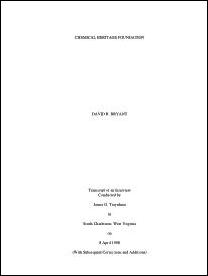Oral history interview with Frederick J. Karol
- 1995-Jan-10
Oral history interview with Frederick J. Karol
- 1995-Jan-10
This interview with Frederick J. Karol begins with a short discussion of Karol's family background and childhood near Boston, Massachusetts. Following an early interest in chemistry, Karol in 1946 enrolled at Boston University and graduated with a BS in chemistry before enlisting for two years of military service. He worked for Union Carbide from 1956 to 1959, began a family, and then entered a graduate program at MIT, studying statistical thermodynamics and organic chemistry under Gardner Swain and conducting thesis research on isotope effects. He continued catalysis research upon his return to Carbide in 1962, eventually developing a variety of proprietary catalysts for use with a high density polyethylene gas phase process. Karol's contributions to the development of a gas phase process for making polyethylene products under low pressure helped to revolutionize the industry, as Union Carbide next developed this technology to commercial operations. The interview describes the worldwide licensing of the linear low density polyethylene process, its economic and environmental advantages, and the extension of this technology into synthetic rubbers; also discussed are the technical and management necessities for such innovative developments. Karol contributed to Carbide's collaboration with Shell Chemical Company, which produced polypropylene, improved the catalytic system to make a wider spectrum of polypropylenes, and eventually led to process licensing. Here Karol discusses kinetic and analytic studies to understand the fundamental principles and mechanisms of polymerization; catalyst requirements and testing involving screening of reactions, analysis of property indicators, and use of pilot plants for testing; and his role in guiding development. After describing Karol's education and subsequent research, the interview focuses on Union Carbide's history and work environment, support for R&D and publishing, and Karol's career progress and professional philosophies on management and scientific innovation. Karol describes the history of linear low density polyethylene, the development of both the Ziegler-Natta process and the UNIPOL process, and Union Carbide's licenses and worldwide ventures. The interview closes with a discussion of the future of R&D and the chemical industry, and the significance of the Perkin Medal.
| Property | Value |
|---|---|
| Interviewee | |
| Interviewer | |
| Sponsor | |
| Place of interview | |
| Format | |
| Genre | |
| Extent |
|
| Language | |
| Subject | |
| Rights | Creative Commons Attribution-NonCommercial-NoDerivatives 4.0 International License |
| Rights holder |
|
| Credit line |
|
About the Interviewer
James J. Bohning was professor emeritus of chemistry at Wilkes University, where he had been a faculty member from 1959 to 1990. He served there as chemistry department chair from 1970 to 1986 and environmental science department chair from 1987 to 1990. Bohning was chair of the American Chemical Society’s Division of the History of Chemistry in 1986; he received the division’s Outstanding Paper Award in 1989 and presented more than forty papers at national meetings of the society. Bohning was on the advisory committee of the society’s National Historic Chemical Landmarks Program from its inception in 1992 through 2001 and is currently a consultant to the committee. He developed the oral history program of the Chemical Heritage Foundation, and he was CHF’s director of oral history from 1990 to 1995. From 1995 to 1998, Bohning was a science writer for the News Service group of the American Chemical Society. In May 2005, he received the Joseph Priestley Service Award from the Susquehanna Valley Section of the American Chemical Society. Bohning passed away in September 2011.
Institutional location
| Department | |
|---|---|
| Collection | |
| Oral history number | 0125 |
Related Items
Interviewee biographical information
| Born |
|
|---|---|
| Died |
|
Education
| Year | Institution | Degree | Discipline |
|---|---|---|---|
| 1949 | Boston University | BS | Chemistry |
| 1962 | Massachusetts Institute of Technology | PhD | Organic Chemistry |
Professional Experience
Union Carbide Company
- 1956 to 1959 Chemist, Chemical and Plastics Group
Union Carbide Corporation
- 1962 to 1965 Chemist, Chemical and Plastics Group
- 1965 to 1967 Project Scientist
- 1967 to 1969 Research Scientist
- 1969 to 1978 Group Leader, Chemical and Plastics Group
- 1978 to 1981 Research Associate and Group Supervisor
- 1981 to 1984 Corporate Fellow
- 1984 Senior Corporate Fellow
Honors
| Year(s) | Award |
|---|---|
| 1982 | Thomas Edison Patent Award, R&D Council of New Jersey |
| 1987 | Excellence in Catalysis Award, Catalysis Society of Metropolitan New York |
| 1988 | Chemical Pioneer Award, American Institute of Chemists |
| 1989 | Perkin Medal, Society of Chemical Industry (American Section) |
| 1989 | Conley Award for Plastics/Engineering Technology, Society of Plastics Engineers |
| 1990 | International Award, Society of Plastics Engineers |
| 1990 | Collegium of Distinguished Alumni, Boston University |
| 1991 | Award for Creative Invention, American Chemical Society |
| 1991 | 50th Anniversary Recognition Award, Society of Plastics Engineers (Newark) |
| 1992 | New Jersey Inventors Hall of Fame |
| 1992 | Outstanding Presentation Award, American Institute of Chemical Engineers Meeting, New Orleans |
Cite as
See our FAQ page to learn how to cite an oral history.
Complete transcript of interview
karol_fj_0125_FULL.pdf
The published version of the transcript may diverge from the interview audio due to edits to the transcript made by staff of the Center for Oral History, often at the request of the interviewee, during the transcript review process.









